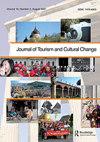绿脸还是红脸?游客遇到不负责任的环境行为时的策略
IF 2.5
4区 管理学
Q2 HOSPITALITY, LEISURE, SPORT & TOURISM
引用次数: 2
摘要
摘要旅游者的绿色行为对旅游业的可持续发展具有重要意义。以往的研究大多认为游客独立发挥绿色行为,忽略了游客与游客互动及其所嵌入的文化的影响。本研究以访问两个湖泊旅游目的地(杭州西湖和湖州仙山湖)的中国游客为研究对象,旨在考察不同关系下的游客互动如何影响中国面孔文化环境下的游客现场绿色行为。基于使用临界事件技术的定性研究方法,对76起事件进行了调查,涉及29名不同背景的中国游客。这项研究表明,游客之间的遭遇受到关系类型(家人、朋友和陌生人)和中国面孔文化(渴望获得面子和害怕失去面子)的影响。研究结果通过考虑对绿色行为产生积极或消极影响的各种类型的社会互动,为可持续旅游文献做出了贡献。关于人脸意识如何影响中国人的社会交往和旅游业的绿色行为,我们有了新的见解。对游客之间社会互动的分析为目的地管理组织加强绿色行为和改进可持续管理实践提供了一个新的视角。本文章由计算机程序翻译,如有差异,请以英文原文为准。
Green or red faces? Tourist strategies when encountering irresponsible environmental behavior
ABSTRACT Tourists’ green behavior plays a significant role in sustainable tourism development. Most of the previous research considered tourists exert green behavior independently, neglecting the influences of tourist-to-tourist interaction and the culture they are embedded in. This study took Chinese tourists visiting two lake tourism destinations (West Lake in Hangzhou and Xianshan Lake in Huzhou) as the research respondents and aimed to examine how tourist-to-tourist interaction within different relationships impact tourist on-site green behavior in Chinese face-culture settings. Based on a qualitative research approach using the critical incident technique, 76 incidents were investigated involving 29 Chinese tourists with different backgrounds. This research showed that the encounters among tourists were affected by the types of relationships (family, friends, and strangers) and Chinese face culture (the desire to gain face and the fear of losing face). The results contribute to the sustainable tourism literature by taking into consideration various types of social interactions, which positively or negatively affect green behavior. Fresh insights are revealed on how face consciousness influences Chinese social interactions and green behavior in tourism. The analysis of social interactions among tourists provides a new perspective for destination management organizations to enhance green behavior and improve sustainable management practices.
求助全文
通过发布文献求助,成功后即可免费获取论文全文。
去求助
来源期刊

Journal of Tourism and Cultural Change
HOSPITALITY, LEISURE, SPORT & TOURISM-
CiteScore
5.10
自引率
9.10%
发文量
31
期刊介绍:
Journal of Tourism and Cultural Change ( JTCC ) is a peer-reviewed, transdisciplinary and transnational journal. It focuses on critically examining the relationships, tensions, representations, conflicts and possibilities that exist between tourism/travel and culture/cultures in an increasingly complex global context. JTCC provides a forum for debate against the backdrop of local, regional, national and transnational understandings of identity and difference. Economic restructuring, recognitions of the cultural dimension of biodiversity and sustainable development, contests regarding the positive and negative impact of patterns of tourist behaviour on cultural diversity, and transcultural strivings - all provide an important focus for JTCC . Global capitalism, in its myriad forms engages with multiple ''ways of being'', generating new relationships, re-evaluating existing, and challenging ways of knowing and being. Tourists and the tourism industry continue to find inventive ways to commodify, transform, present/re-present and consume material culture. JTCC seeks to widen and deepen understandings of such changing relationships and stimulate critical debate by: -Adopting a multidisciplinary approach -Encouraging deep and critical approaches to policy and practice -Embracing an inclusive definition of culture -Focusing on the concept, processes and meanings of change -Encouraging trans-national/transcultural perspectives
 求助内容:
求助内容: 应助结果提醒方式:
应助结果提醒方式:


